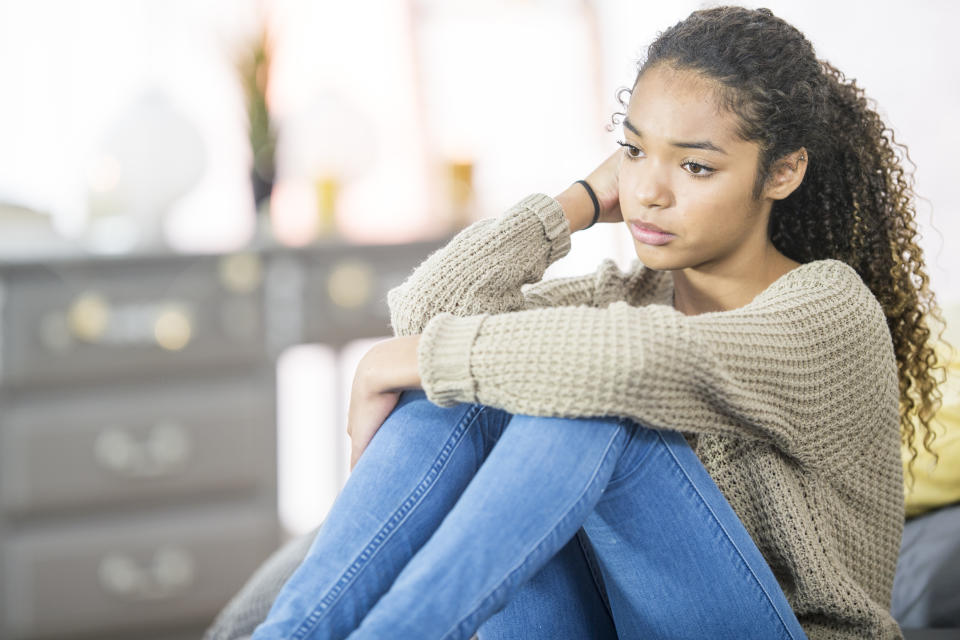5 influencers on the stress of being Black in America and why free mental health care 'has to' exist for people of color
July is BIPOC (Black, Indigenous and People of Color) Mental Health Month, also referred to as Minority Mental Health Awareness Month. As millions around the world work to amplify and stand in solidarity with the Black Lives Matter movement, it has become clear that Black mental health needs to matter too.
Historically mental health in the Black community has been a taboo topic. The stigma surrounding needing help, coupled with the trauma of systemic racism and the onslaught of the coronavirus pandemic, has caused many Black Americans to grapple with a range of issues, including anxiety and depression.

Being Black in America should not come with inherent oppression and predisposed health conditions, but it does — and navigating these burdens is a lot to bear.
To further discuss the stress that comes with being Black in America, Yahoo Life spoke with five Black public figures who are raising awareness about the importance of seeking therapy or other forms of treatment for mental health and how to navigate this current social climate.
“Free mental health care is just something that has to 1,000 percent exist for Black and brown people,” says Alysha Pamphile, cinematographer and host of the Black Girl Podcast. Pamphile, who has openly shared her journey with therapy that began after her father died, is an advocate for professional help. Through the Black Girl Podcast, Pamphile has created a community for those interested in therapy but may not have access to resources.
Similarly, Ashley Akunna and Donovan Thompson, producers on the popular YouTube series The Grapevine, have created a safe space for millennials of color to openly discuss a wide range of topics, from mental health to HBO’s Insecure. The discussions on the show can sometimes get heated, but ultimately the purpose is to increase awareness about important issues and educate their audience.
“Taking the stigma away from therapy was also big for me,” Akunna says. “I’m Nigerian-American, and I cannot tell you how often I hear people say that therapy is not for them. They don’t need it. It’s for white people. So, like Alysha, therapy has helped me.”
“A combination of unplugging and then also being able to just do what I can where I can was very, very helpful for me,” Thompson says of how he takes care of his mental health.
As parents, both Doyin Richards, bestselling children’s author and keynote speaker, and Kimberly Jones, an activist, writer and filmmaker, discuss the balance of prioritizing their own mental health while also protecting their children’s.
“I’m very transparent with my son about my mental health concerns,” Jones says. “He knows that Mommy has ADHD and anxiety and what that means and how my responses are. And we have systems when he can tell that I’m feeling anxious.”
Though Jones describes a very open and healthy relationship with her 14-year-old son, she admits it doesn’t come without its challenges.
“Sometimes I feel a certain level of guilt as a parent, right? He has to take on this responsibility of understanding how to deal with a mother, you know, with mental health concerns,” she explains. “But I mean, honestly, I don’t know if there are any Black people in America without mental health concerns. I don’t know if you’re being honest with yourself if you don’t have any. It is a rough road that has been given to us in many, many different ways. So finding that balance as a parent — it’s difficult.”
For Richards, his experience with depression has greatly shaped how he approaches mental health advocacy.
“I almost took my own life due to depression, and I am clinically depressed,” he says. “That’s something that a lot of Black men aren’t willing to admit or talk about publicly.”
Above all, Richards says his focus is to raise his two daughters, who are 6 and 9, to be strong Black women and “know that they’re great inside and out.”
Mental health should not be a topic the Black community has to tiptoe around. If you’re struggling to find resources, below is a list of some people and networks that provide mental health support:
Watch the video above to learn more about mental health in the Black community.
Video produced by Kelly Matousek and Gisselle Bances
If you or someone you know is experiencing suicidal thoughts, call 911, or call the National Suicide Prevention Hotline at 1-800-273-8255 or text HOME to the Crisis Text Line at 741741.
For the latest coronavirus news and updates, follow along at https://news.yahoo.com/coronavirus. According to experts, people over 60 and those who are immunocompromised continue to be the most at risk. If you have questions, please reference the CDC’s and WHO’s resource guides.
How to maintain your physical and mental health during the pandemic
Taking care of a loved one with COVID-19? Here’s how to stay healthy
Q&A with Dr. Kavita Patel: How to keep your family safe and maintain your mental health
Read more from Yahoo Life
Want daily lifestyle and wellness news delivered to your inbox? Sign up here for Yahoo Life’s newsletter.

